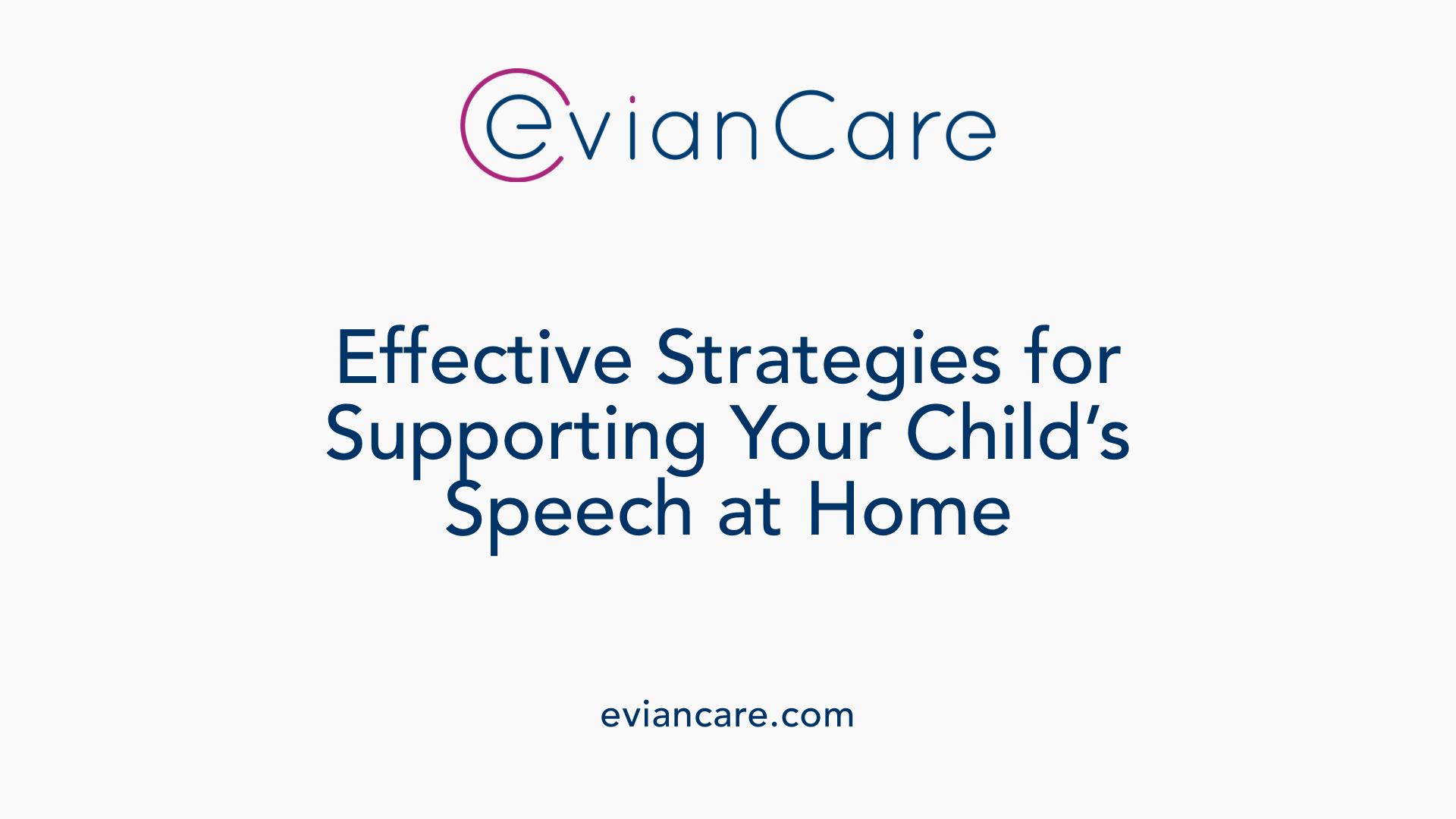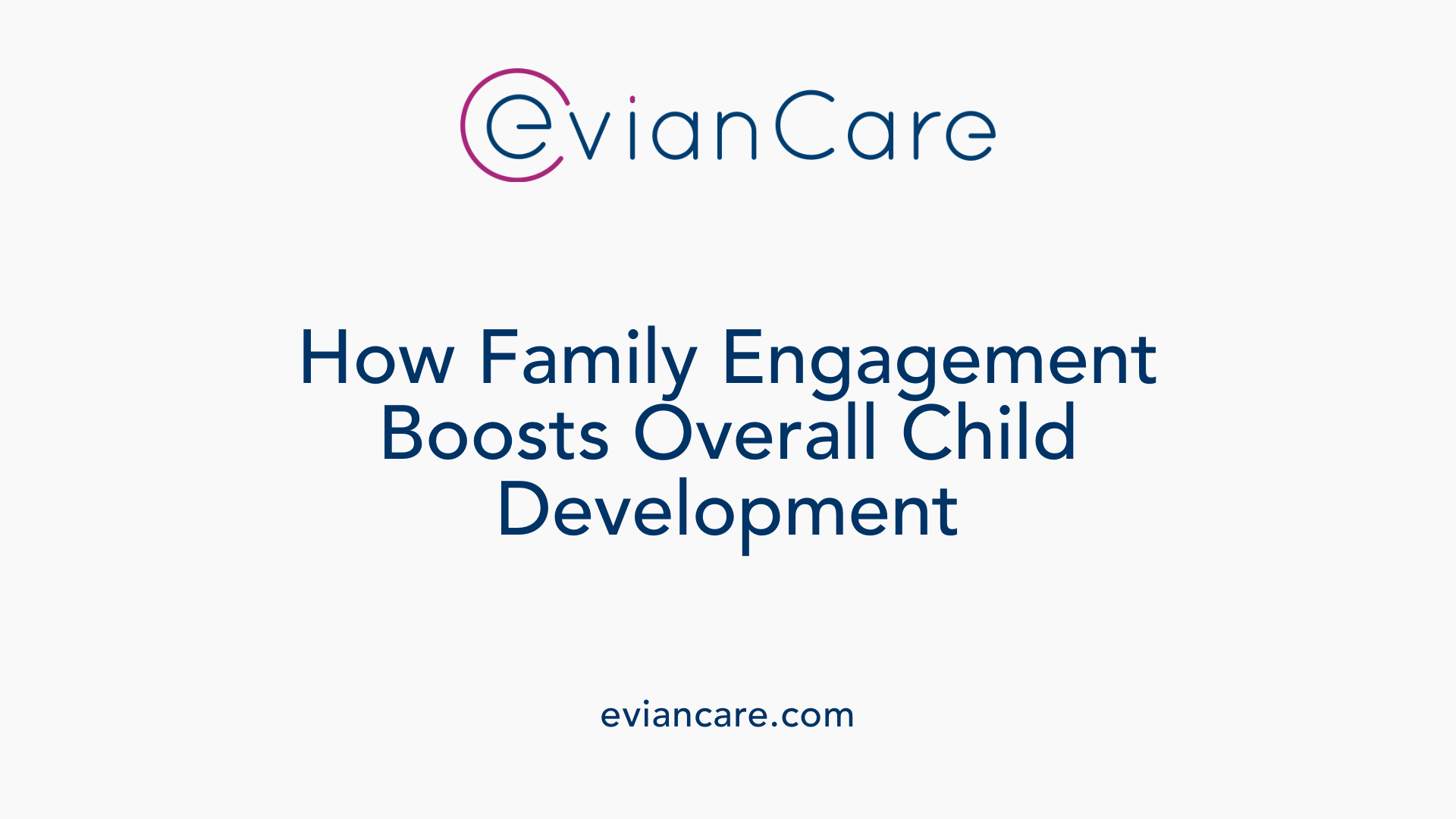
Understanding the Critical Role of Families in Speech Therapy
Family involvement is recognized as a cornerstone of effective speech and language therapy for children. Engaged families not only reinforce therapy techniques at home but also foster an environment that promotes continuous development. This article explores how family participation enhances therapy outcomes, the strategies to facilitate involvement, and the evidence supporting such collaborative approaches.
The Benefits of Family Involvement in Speech Therapy

How does family involvement influence therapy outcomes?
Family involvement plays a crucial role in the success of speech therapy for children. When parents actively participate in therapy, they help reinforce learned skills outside of sessions, creating a consistent and supportive environment. This continuous support not only enhances the child's confidence and motivation but also allows therapy approaches to be tailored more precisely to the child's needs. Engaged families can address underlying issues, such as emotional or behavioral barriers, which might otherwise hinder progress.
Research indicates that family-centered care leads to better communication and emotional outcomes. For instance, programs like Functional Family Therapy (FFT) demonstrate reductions in recidivism and promote long-term behavioral change in at-risk youth. When families collaborate closely with therapists, they foster resilience in children, strengthen emotional bonds, and create a positive, reinforcing environment that boosts sustained therapeutic success.
Ultimately, a family-inclusive approach helps children develop better emotional regulation, social skills, and speech performance, serving as a foundation for ongoing communication growth.
What research supports the importance of family engagement in speech therapy?
Numerous studies highlight the importance of family involvement in speech therapy. For example, research published in the Journal of Applied Developmental Psychology emphasizes the value of reminiscing about past experiences. This activity encourages rich, high-quality parental speech through elaborative questions such as who, what, where, when, and why. Such engagement directly promotes children’s language development.
Further, studies like those by Kyrsten Theodotou observe that children with more involved families tend to progress more swiftly. The evidence suggests that active parental participation—whether through practicing speech exercises, providing emotional support, or integrating strategies into daily routines—significantly enhances therapy effectiveness.
Research by Vanderbilt University also found that children who received parent-implemented interventions show notable improvements in vocabulary, grammar, and overall communication skills. These findings underscore the vital role of family engagement in achieving better therapeutic results.
What strategies can facilitate family involvement in a child's speech therapy?
Effective strategies to promote family involvement include clear education, active training, and consistent communication. Speech-language pathologists (SLPs) can start by educating families about the importance of their role and providing simple, practical exercises that fit into daily routines such as mealtimes, play, or bedtime.
Techniques like quantity-based approaches increase language exposure, while responsive methods like imitation and expansion encourage active participation. Using visual cues, picture boards, or speech generating devices further supports children with minimal verbal skills.
Creating a collaborative goal-setting process and maintaining regular contact with families through written updates, text reminders, or phone calls also enhance consistency. Encouraging homework-like activities, tailored to the child's interests and everyday environment, helps parents practice and reinforce communication skills confidently.
Incorporating family feedback and adapting strategies as needed fosters a sense of ownership and commitment, driving better developmental outcomes.
What is the role of families as co-therapists or partners in speech therapy?
Parents and families are central partners, acting as co-therapists in the child’s communication development. Their role involves practicing speech strategies, creating language-rich environments, and integrating therapy goals into daily routines.
By sharing insights about their child's preferences, behaviors, and responses, families help customize intervention plans, making therapy more relevant and effective. They serve as role models, encouraging communication attempts and providing positive reinforcement.
Family participation extends beyond practicing speech sounds—families help foster motivation, emotional support, and social interaction. When families are trained and coached by therapists, they become effective facilitators of skill generalization, ensuring progress continues beyond the clinical setting.
This partnership not only accelerates speech development but also strengthens familial bonds, making the journey towards better communication shared and rewarding.
Practical Tips for Families Supporting Speech and Language Development

What practical tips can help families support speech and language development at home?
Families play a crucial role in a child's speech and language growth. To support development effectively, it’s important to embed purposeful activities into daily routines. For example, narrate actions as you do them, like "Now we are pouring juice," or ask open-ended questions to encourage conversation.
Using visual aids such as pictures, flashcards, or storyboards helps children understand and practice vocabulary. Engaging in singing, reading picture books, and playing interactive games like role-play or word matching can make learning fun and meaningful.
Encouraging children to express themselves through choices—like choosing between two snacks or activities—can foster independence. Modeling complete sentences and using sign language are additional ways to support understanding and expression.
Consistency is vital. Regularly practicing speech exercises, collaborating with speech-language pathologists, and creating a distraction-free, language-rich environment all contribute to progress. Patience, positive reinforcement, and celebrating small milestones motivate children and boost their confidence.
How does family participation impact child development and therapy success?
When families actively participate in speech therapy, children often show more significant progress. Engagement includes participating in therapy sessions, encouraging practice at home, and maintaining routine activities that promote communication.
Supportive family environments strengthen the child's emotional well-being and help reinforce skills learned during therapy. For example, creating predictable routines around speech practice makes children feel secure and more willing to participate.
Research indicates that families who follow through with home activities see improvements in vocabulary, articulation, and social communication. Building positive habits and providing consistent, patient support foster resilience and inspire children to try new ways of communicating.
Involving family members in therapy not only accelerates progress but also ensures that learning continues beyond the clinical setting, leading to long-term benefits.
What practical tips can help families support speech and language development at home?
To optimize at-home support, families should focus on creating a language-rich environment. Talk to children regularly about daily activities, narrate stories, and describe objects or actions.
Incorporate play-based learning by singing songs, reading engaging stories, and using interactive games that promote vocabulary and speech practice. Establish a daily routine that includes dedicated time for speech activities, making it predictable and comfortable.
Use visual aids like picture cards or digital apps to foster understanding and facilitate expressive language. Include siblings and other family members in activities to make practice more enjoyable.
Encourage children to self-monitor their speech and celebrate their progress with praise. Balance screen time with real-world interactions and avoid rushing, allowing children to communicate at their own pace.
Patience and positive feedback are essential. Tailoring activities to each child's interests helps keep motivation high. Remember, consistent effort and a supportive environment are central to encouraging meaningful speech and language development.
Family Involvement and Its Broader Impact on Child Development

How does family participation impact child development and therapy success?
Family participation plays a crucial role in shaping a child's speech and language development, as well as the overall success of therapy. When parents actively engage in their child's communication journey, they create an environment rich in support, encouragement, and consistent practice.
Engaged families tend to reinforce learning outside of therapy sessions by incorporating speech activities into daily routines, such as mealtimes, play, and storytime. This consistency accelerates skill acquisition and helps children transfer new skills into real-world settings.
Research highlights that family involvement leads to higher therapy attendance, adherence to home programs, and more positive child outcomes, especially in areas like vocabulary, grammar, and communication frequency. Family dynamics, including positive parenting practices and emotional support, foster resilience and motivation in children.
Strategies like psychoeducation for parents, rapport building with therapists, and open communication are effective in increasing participation. When families understand therapy goals and techniques, they are better equipped to implement strategies effectively.
Furthermore, the overall family environment influences a child's emotional well-being and readiness to communicate. Supportive and warm family interactions nurture confidence and reduce anxiety, which can enhance therapy progress.
In summary, family participation not only bolsters immediate therapeutic gains but also ensures these gains are maintained and generalized across settings. By integrating care across home, school, and community, families provide a foundation for long-term development and well-being.
What is the importance of family involvement in speech therapy?
Family involvement in speech therapy is fundamental because it extends the reach and effectiveness of clinical interventions. Children with speech and language difficulties often require ongoing practice and reinforcement to make meaningful progress.
Parents and family members serve as primary facilitators of this practice, helping to embed speech and language activities into everyday life. This integration builds a child's confidence and motivation, making therapy more effective.
Active families also foster a collaborative relationship with therapists, enabling tailored strategies that align with the child's individual needs and family circumstances. This partnership enhances the relevance and practicality of intervention plans.
Addressing barriers like limited time, language differences, or lack of awareness is vital. Providing families with suitable resources, clear instructions, and regular communication helps overcome these obstacles, ensuring consistent and meaningful involvement.
Ultimately, family participation creates a supportive and nurturing environment, empowering children to develop their communication skills and achieve greater independence, learning, and social engagement. It transforms therapy from a session-based activity into a comprehensive, lifelong development process.
Fostering Long-Term Communication Success
In conclusion, family involvement stands as a vital element in the success of speech and language therapy. When families are actively engaged—through education, consistent practice, and emotional support—they significantly amplify the positive outcomes of therapeutic interventions. Building strong collaboration between speech-language pathologists and families creates a tailored, supportive environment conducive to real-world application and sustained communication skills. As research supports, empowering families to participate fully in the process not only accelerates progress but also ensures that children develop the confidence and skills necessary for lifelong communication success. Investing in family-centered approaches, fostering open communication, and providing practical guidance for at-home practice are essential steps toward optimal therapy outcomes and healthy developmental trajectories for children with speech and language needs.
References
- Collaboration between parents and SLTs produces optimal ...
- Facilitating parental involvement in children's speech therapy
- The Importance of Parent Involvement in the Speech Therapy Process
- How speech and language therapists and parents work together in ...
- Empowering Parents as Co-Therapists: Strategies for Effective ...
- The Importance of Parental Involvement in Speech Therapy
- Why Working With the Entire Family Gets the Best Results in Kids ...












